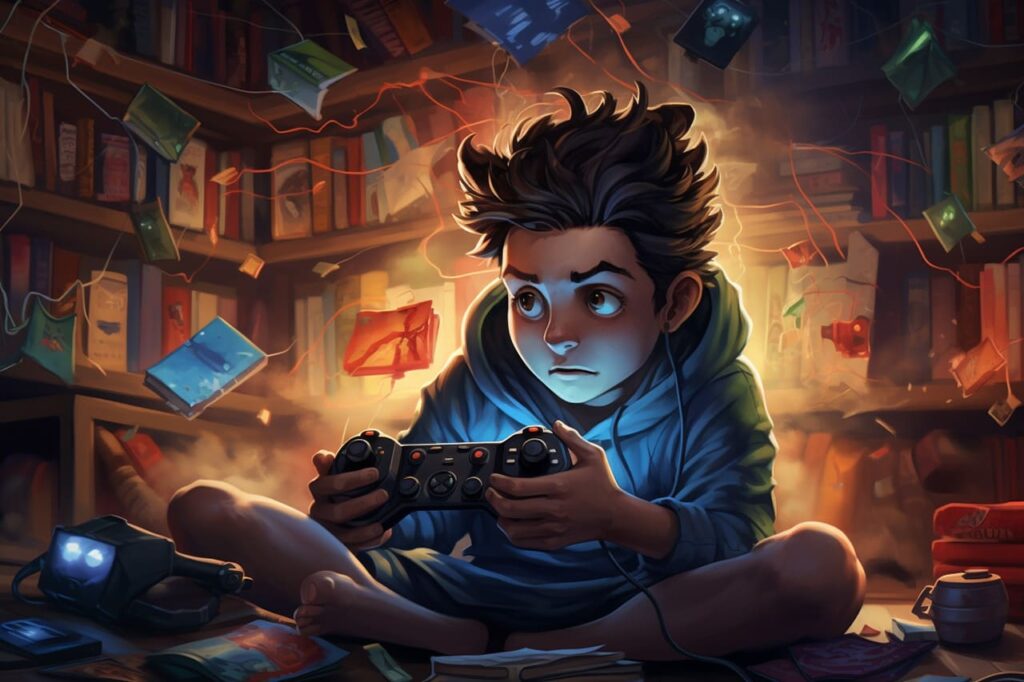For many, playing video games is a fun and engaging pastime. It can be a great way to unwind after a long day or to connect with friends online. However, for some individuals, gaming can become an addiction.
Gaming addiction is a real and serious issue that affects individuals of all ages and walks of life. The World Health Organization (WHO) recognized gaming disorder as a mental health condition in 2018, citing its negative impact on a person’s health and social life. In this article, we’ll explore the signs and symptoms of gaming addiction, as well as what you can do to break the cycle.
What is Gaming Addiction?
Gaming addiction, also known as gaming disorder, is a behavioral addiction that is characterized by a compulsive need to play video games. Those who suffer from gaming addiction are unable to control their gaming habits, even in the face of negative consequences such as declining physical health, strained relationships, and reduced academic or work performance.
Like other behavioral addictions, gaming addiction can have serious consequences for a person’s mental and physical health. For example, excessive gaming can lead to sleep deprivation, poor nutrition, and physical inactivity. Gaming addiction can also result in social isolation, strained relationships, and a reduced quality of life.
Signs and Symptoms of Gaming Addiction
If you’re concerned that you or someone you know may be suffering from gaming addiction, here are some common signs and symptoms to look out for:
Preoccupation with Gaming
Those who suffer from gaming addiction may find themselves preoccupied with thoughts of gaming, even when they’re not actively playing. They may constantly be thinking about the game, strategizing about how to beat the next level, or imagining how to customize their in-game characters.
Inability to Control Gaming Habits
Individuals with gaming addiction are often unable to control their gaming habits, even when they know that it’s having negative consequences. They may spend hours playing video games every day, neglecting other responsibilities such as work, school, or social obligations.
Withdrawal Symptoms
Those with gaming addiction may experience withdrawal symptoms when they’re not able to play video games. These symptoms can include anxiety, depression, irritability, and restlessness.
Escalation of Gaming Time
Individuals with gaming addiction often spend more and more time playing video games in order to achieve the same level of satisfaction as before. They may need to play for longer periods of time, or play more often, in order to feel satisfied.
Negative Consequences
Those with gaming addiction may experience negative consequences as a result of their gaming habits. These consequences can include physical symptoms such as back pain or headaches, strained relationships with family and friends, poor academic or work performance, and financial difficulties.
Breaking the Cycle
If you or someone you know is suffering from gaming addiction, it’s important to take steps to break the cycle. Here are some tips for overcoming gaming addiction:
Seek Professional Help
If you’re struggling with gaming addiction, it’s important to seek professional help. A mental health professional can help you develop a treatment plan that’s tailored to your needs. This may include individual or group therapy, medication, or other forms of treatment.
Create a Schedule
One way to control your gaming habits is to create a schedule for when and how long you play video games. Set specific times for gaming, and stick to them. This can help you balance your gaming habits with other responsibilities and activities.
Find Alternative Activities
To break the cycle of gaming addiction, it’s important to find alternative activities that you enjoy. This can help you shift your focus away from gaming and develop healthier habits. Consider activities such as exercise, hobbies, or socializing with friends.
Set Goals
Setting goals for yourself
can help you break the cycle of gaming addiction. Consider setting goals for other areas of your life, such as work or education. This can give you a sense of purpose and motivation to make positive changes in your life.
Limit Access to Games
If you’re struggling with gaming addiction, it may be helpful to limit your access to video games. Consider uninstalling games from your computer or smartphone, or even selling your gaming console. This can help you break the cycle of addiction and reduce the temptation to play.
Get Support
Breaking the cycle of gaming addiction can be challenging, but it’s important to know that you’re not alone. Reach out to friends and family for support, and consider joining a support group for individuals with gaming addiction. These groups can provide a safe and supportive space to share experiences and receive encouragement.
Conclusion
Gaming addiction is a real and serious issue that affects individuals of all ages and walks of life. If you or someone you know is struggling with gaming addiction, it’s important to take steps to break the cycle. Seek professional help, create a schedule, find alternative activities, set goals, limit access to games, and get support from friends and family.
Remember, it’s never too late to make a change. By taking steps to overcome gaming addiction, you can improve your mental and physical health, build stronger relationships, and achieve a better quality of life.

